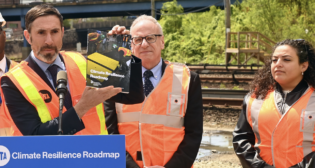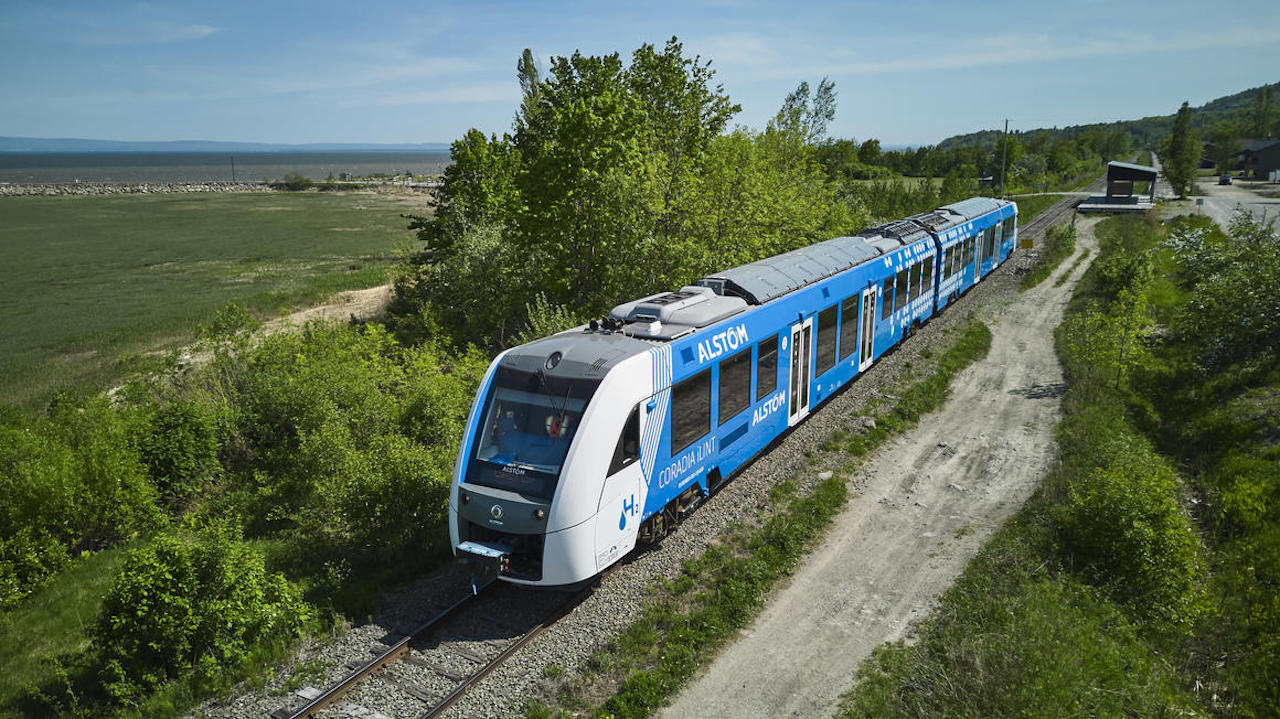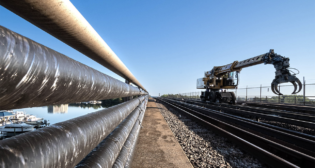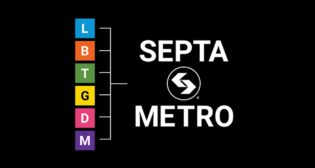
Alstom’s Coradia iLint Enters Revenue Service in Quebec
Written by Carolina Worrell, Senior Editor
Alstom's Coradia iLint hydrogen train carried its very first North American passengers on June 17, 2023
On June 17, 2023, 100 passengers boarded Alstom’s Coradia iLint for the first hydrogen fuel cell (HFC) rail journey in North America.
The trip, a joint effort of Alstom and its partners the Government of Quebec, Chemin de fer Charlevoix (Train de Charlevoix), Harnois Énergies, HTEC and Accelera by Cummins (the new brand for Cummins’ New Power business segment), operated between the Parc de la Chute-Montmorency in Quebec City to Baie-Saint-Paul, a 90-kilometer (56-mile) distance in the heart of the UNESCO-listed Charlevoix Biosphere Reserve along the St. Lawrence River.
The Coradia iLint is self-propelled with HFC technology supplied by Accelera by Cummins, which has operations in Ontario, and is powered by green hydrogen produced by Harnois Énergies at its Quebec City site.
The Province of Quebec is the first jurisdiction in North America to run a passenger train with zero direct emissions powered by green hydrogen, “demonstrating its leadership in the transition to a low-carbon economy and the set-up of ecosystems dedicated to hydrogen,” Alstom said. Commercial operation will allow Alstom and its partners to “better assess the subsequent steps for the development of an ecosystem for hydrogen propulsion technology and its penetration into the North American market.” The Hydrogen Research Institute of the Université du Québec à Trois-Rivières will accompany Alstom in analyzing the demonstration project’s results.
The Coradia iLint, which will operate commercially in summer 2023 on the Réseau de Charlevoix railway network, first entered commercial service in Germany in 2018 and has traveled more than 220,000 kilometers (136,000 miles) in eight European countries. Currently, it is operating in commercial service on two German networks. Its HFC propulsion system emits only water vapor during operation, while ensuring a quieter environment for passengers and communities along the right-of-way. On Sept. 15, 2022, a Coradia iLint traveled a record 1,175-kilometer (729-mile) distance without refueling. The trainset has a top speed of 140 kph (85 mph) and acceleration and a braking performance comparable to a standard regional diesel train.
The Coradia iLint, Alstom says, “stands out for its combination of innovative features,” including “clean energy conversion, flexible energy storage in batteries, smart traction and energy management.” Designed especially for non-electrified lines, it allows for “safe, clean and sustainable operations.” To date, 41 trainsets have been ordered by European railways.
Chemin de fer Charlevoix (reporting mark CFC) is a short line that operates in the Charlevoix region of Quebec. From 1994 to 2009 it was a subsidiary of short line operator Quebec Railway Corporation. Since April 2009 it has been owned by Train touristique de Charlevoix Inc., a Groupe Le Massif Inc. subsidiary. It connects the city of Clermont in the Charlevoix region to a CN freight yard in Quebec City’s La Cité-Limoilou borough. The single-track, non-electrified railway runs along the St. Lawrence and Malbaie Rivers.
“We are very proud to see our Coradia iLint hydrogen train onboard and carry its first North American passengers here in Quebec,” said Alstom Americas President Michael Keroullé. “Alstom is fully involved in the decarbonization of mobility in the world and particularly in America. Hydrogen technology offers an alternative to diesel and demonstrates our ability to provide more sustainable mobility solutions to our customers, agencies and operators, as well as passengers. It will also provide an extraordinary showcase for Quebec’s green hydrogen ecosystem, which is under development.”
“This project is made possible thanks to the collaboration of Chemin de fer de Charlevoix,” said President Claude Choquette, who also heads Groupe Le Massif. “In addition to defining new foundations for sustainable tourism, the hydrogen train’s launch allows many visitors from around the world to discover Charlevoix while creating value for the entire region.”
“Harnois Énergies is a partner in this project, positioning itself not only as a hydrogen producer, but also as a distributor,” noted Harnois Énergies President and CEO Serge Harnois. ”The hydrogen will be produced at our Quebec City station and will then be transported via high-pressure tanks to Baie St-Paul. Harnois Énergies is focused on the future and keeps an open mind. Energy diversification is at the heart of the company’s priorities.”
“As Accelera continues to innovate, we’re guiding customers through energy transition roadmaps by providing end-to-end hydrogen solutions,” said General Manager of Fuel Cell and Hydrogen Technologies Alison Trueblood. “This includes advancing traditional transportation methods, like passenger trains through the adoption of zero-emission technologies and enabling industry infrastructure with hydrogen-producing electrolyzers. Together with Alstom and many other partners, we are advancing hydrogen propulsion technology in the North American market.”
According to Alstom, commercial service of the Coradia iLint in Quebec is the first mandate of the company’s innovation center in the Americas, which is located in Saint-Bruno-de-Montarville, Quebec and is “dedicated to sustainable mobility solutions.” This, Alstom says is “the first milestone in the development of an ecosystem around its rail solutions with zero direct emissions.” The center’s primary mission is development of future platforms with hybrid, battery or green hydrogen propulsion specifically adapted to the North American market, “leveraging the proximity to the more than 700 Alstom engineers currently working in the city to help accelerate the decarbonization of the rail sector.”
Further Reading:
- Alstom Coradia iLint Passes Tests
- Alstom Coradia iLint wins GreenTec Mobility Award
- Fuel cells power Alstom’s Coradia iLINT



